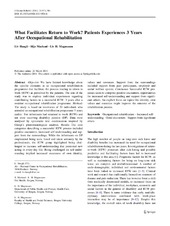What Facilitates Return to Work? Patients Experiences 3 Years After Occupational Rehabilitation
Peer reviewed, Journal article
Published version
Permanent lenke
https://hdl.handle.net/1956/5220Utgivelsesdato
2011-03-26Metadata
Vis full innførselSamlinger
Originalversjon
https://doi.org/10.1007/s10926-011-9304-6Sammendrag
Objective We have limited knowledge about the specific elements in an occupational rehabilitation programme that facilitate the process leading to return to work (RTW) as perceived by the patients. The aim of the study was to explore individual experiences regarding contributing factors to a successful RTW, 3 years after a resident occupational rehabilitation programme. Methods The study is based on interviews of 20 individuals who attended an occupational rehabilitation programme 3 years earlier. Ten informants had returned to work (RTW) and ten were receiving disability pension (DP). Data were analysed by systematic text condensation inspired by Giorgi’s phenomenological analysis. Results The core categories describing a successful RTW process included positive encounters, increased self-understanding and support from the surroundings. While the informants on DP emphasized being seen, heard and taken seriously by the professionals, the RTW group highlighted being challenged to increase self-understanding that promoted new acting in every-day life. Being challenged on self-understanding implied increased awareness of own identity, values and resources. Support from the surroundings included support from peer participants, employer and social welfare system. Conclusion Successful RTW processes seem to comprise positive encounters, opportunities for increased self-understanding and support from significant others. An explicit focus on topics like identity, own values and resources might improve the outcome of the rehabilitation process.

